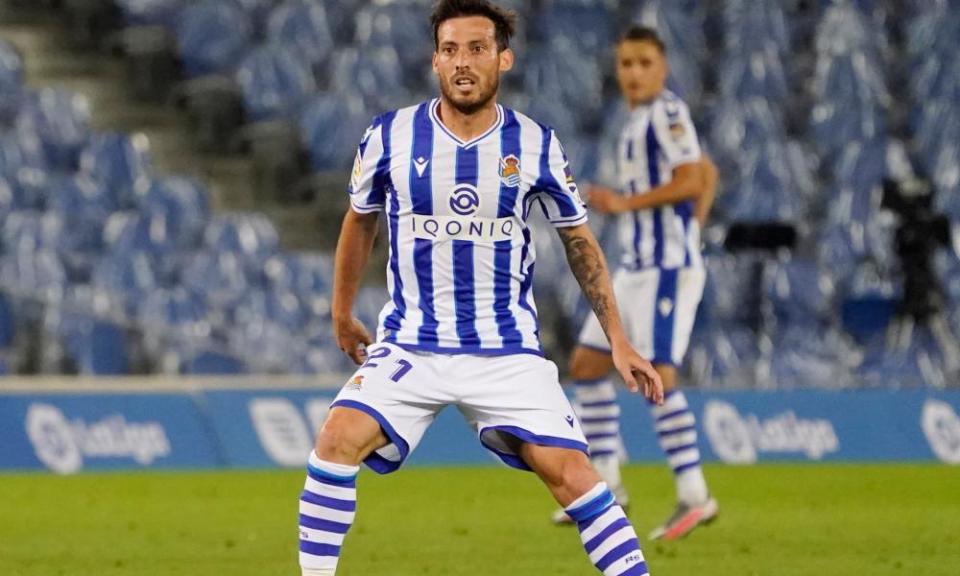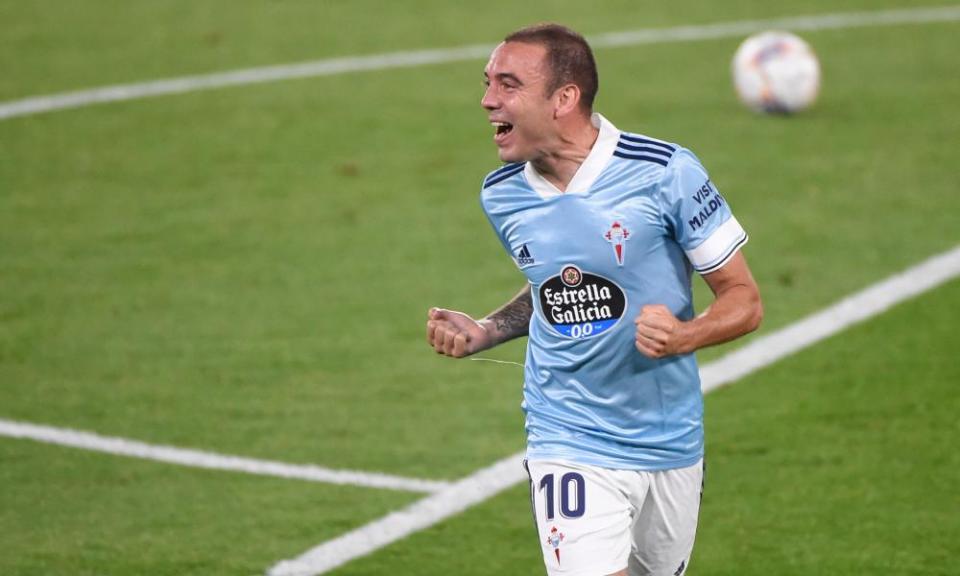David Silva leads La Liga's golden oldies as Real Madrid turn to youth

Dry your eyes, mate. “We cried over his departure,” Miguel-Ángel Moyá said, but the tears didn’t last long. On the final day of last season, Martin Odegaard told his Real Sociedad teammates he was staying for another season, only for Real Madrid to decide differently, changing everything. Twenty days later, recently knocked out of the Champions League, the La Liga winners announced they were bringing him home, four and a half years after he had joined, three since he had set off on loan at Heerenveen, Vitesse and Real Sociedad, and one ahead of schedule.
In San Sebastián, where he had been the country’s outstanding midfielder until lockdown, initially signed for two seasons, it hurt. “When they announced he was leaving, it left us reeling,” admitted the winger Portu.
Related: Bayern Munich blow Schalke away with sensational silent symphony | Andy Brassell
But that was when someone came up with an idea and la Real moved fast. From saying: “Hey, what about trying David Silva?” to actually signing David Silva, less than 24 hours passed. It looked like the kind of daft idea someone throws out there without thinking – he had agreed to go to Lazio – but it was worth a try and ultimately the offer was too good to refuse: the most attractive team in the most attractive city in Spain, a return home 10 years later.
A reality before it was a rumour, suddenly aged 35 he was back in the province where it all began 16 years before at second division Eibar, revelling in training on a rugby pitch in the mud and the snow, as happy to dish it out as pass it about; where, in the words of his then coach, José Luis Mendilíbar: “He was a competitive bastard.”
“No one expected it,” Nacho Monreal told Marca. “When the season finished, we thought Odegaard was going to continue but at the last minute, Madrid took him back. We were left feeling bad. But la Real moved very well and signed a brilliant replacement, spectacular in every way.”
If it had happened fast, things then slowed down. Silva was on holiday when he signed, tested positive for coronavirus, and didn’t travel to Real Sociedad’s first game of the season. He had joined with a physio from City but had trained just four times and didn’t start their second, either.
Even when the coach, Imanol Alguacil, called on him on Sunday night, 60 minutes into their second match, he still had to wait four minutes before he could get on, until eventually one commentator announced the return of “one of the best players this country has ever produced”.
Silva was back in La Liga after 10 years, making it six men left from that World Cup-winning squad.
Here comes David Silva... pic.twitter.com/zF7rtKpDuE
— The Spanish Football Podcast (@tsf_podcast) September 20, 2020
Facing him on the other team was the kid he unexpectedly had to replace. Real Sociedad’s second fixture of the season was Real Madrid’s first – “a special game, against good friends, good people”, as Odegaard put it.
It was a special game but in truth it was not a particularly good one. Madrid had started well, forcing la Real to shift their style, dropping deeper and waiting for the pace to slow, but a familiar issue emerged: Madrid’s lack of goals. “It’s a pity because we played well for the most part,” Zinedine Zidane said.
“The wait for Mbappé will be a long one,” AS complained. Madrid had “no gunpowder”, its front page insisted. “No punch,” lamented Marca. Even with Zidane leaving out Casemiro and choosing Modric and Kroos in midfield with Odegaard in front of them, playing in a line of three behind the forwards, there were few chances created, Benzema putting the best of them just wide.
As it went on, la Real stepped up, the balance tilting. Isaak was denied by Courtois. Ander Berrenetxea’s volley just evaded a post. “If we had been a bit better in front of goal, we could have taken the win,” Alguacil said. When Silva came on, they might have done. Stepping on to the pitch in silence, it was still 0-0. Set up, in other words. And with three minutes left, he exchanged passes on the edge of the area. The ball on his left foot, body opening up, the position was pretty well perfect: this was it. But there was a pause, a moment’s thought, and as fast as the space opened it closed again. Raphaël Varane – perhaps the game’s outstanding player – dived in and blocked the shot.
It would have been some start for Silva. It would also have been a fitting way to close this round of fixtures. This was a weekend for annoyingly young players, but it was more a weekend for reassuringly old ones, unwilling to let go just yet, rebelling against retirement and showing that there’s always hope, always time.
Madrid started with Odegaard, Vinícius and Rodrygo – 21, 20, and 19 – behind Benzema. When Zidane made changes, he decided against using the strikers Luka Jovic, Borja Mayoral or Mariano Díaz, instead handing debuts to Sergio Arribas and Marvin Park. And while there might have been a message there, an expression of how little faith he has in his strikers, there was something exciting about it, symbolic of a generational shift. Arribas is 18. Park, who was born in Mallorca to a South Korean mum and a Nigerian dad, has a Spanish passport and played at Tranmere, is 20. On the other side were the 18-year-old Urko González, making his debut, and Berrenetxea, another 18-year-old who cycles to games. Outstanding again, this is the kid of whom Monreal says: “Mother of God, how good does this lad look?”
At the other end of the scale there was Silva, 14 years older than the kid he replaced but making them smile again in San Sebastián. “When he’s fully fit, he’ll give us so much. Even at 70% he gives us that pause and calmness, he was close to slipping though two or three assists and this close to getting a goal,” Alguacil said.

Silva didn’t score but others did, including Jaime Mata, the 31-year-old who didn’t even make his first division debut until he was 29 and then got into the Spain squad. He got the only goal in Getafe’s win over Osasuna on Saturday and he was not alone. Of the 14 scored in week two, half came from players 30 or over and only two were scored by footballers under 27. There was also, incidentally, plenty of where are they now? for English fans on the weekend when Manuel Pellegrini’s Betis went joint top, the 30-year-old former Newcastle striker Joselu scored for Alavés, and the former Middlesbrough forward Kike García, 30, did the same for Eibar.
Related: Il Maestro: Andrea Pirlo delivers first lesson of thesis at Juventus | Nicky Bandini
Between them, Iago Aspas, Roberto Soldado and Álvaro Negredo are a hundred years old, but they got perhaps the most significant goals over Saturday and Sunday. Still absurdly good, arguably the single most important player for his club in Spain apart from Leo Messi, Aspas is responsible for a third of Celta’s goals over the last seven years. Aged 33, he got two brilliant strikes, the second an astonishing free kick, to defeat Valencia 2-1.
Soldado, once a kid who needed a slap and now a 35-year-old veteran, raced away at a 34 km/h to score the opening goal and lift Granada into first place. And Álvaro Negredo, who is the same age, scored the first to set up Cádiz’s first win in primera for 15 years.
Better still, at the other end, the Cádiz keeper Alberto Cifuentes was making his first division debut. He is 41. After a career that stretches back to last century, taking in Albacete, Dos Hermanas, Ciudad Murcia, Rayo Salamanca, Murcia La Hoya and Piast Gliwice, he joined Cádiz in Segunda B five years ago and found himself. At Huesca on Saturday, he conceded a goal that was ruled out – “I said thanks to the ref, because that would have been a pain” – and then didn’t concede again, keeping a clean sheet on the day he became the oldest first division debutant there has ever been.* “It should have come sooner,” he said, but it came.
*Well, except for Harry Lowe, who played for Real Sociedad at 48 in 1935 and that doesn’t count – he was the coach and stuck himself on for a bit.
Pos | Team | P | GD | Pts |
|---|---|---|---|---|
1 | Granada | 2 | 3 | 6 |
2 | Real Betis | 2 | 3 | 6 |
3 | Villarreal | 2 | 1 | 4 |
4 | Celta Vigo | 2 | 1 | 4 |
5 | Valencia | 2 | 1 | 3 |
6 | Osasuna | 2 | 1 | 3 |
7 | Getafe | 1 | 1 | 3 |
8 | Cadiz | 2 | 0 | 3 |
9 | Real Sociedad | 2 | 0 | 2 |
10 | Real Madrid | 1 | 0 | 1 |
11 | Eibar | 2 | -1 | 1 |
12 | Huesca | 2 | -2 | 1 |
13 | Valladolid | 2 | -2 | 1 |
14 | Atletico Madrid | 0 | 0 | 0 |
15 | Barcelona | 0 | 0 | 0 |
16 | Elche | 0 | 0 | 0 |
17 | Sevilla | 0 | 0 | 0 |
18 | Levante | 1 | -2 | 0 |
19 | Alaves | 2 | -2 | 0 |
20 | Athletic Bilbao | 1 | -2 | 0 |

 Yahoo News
Yahoo News 